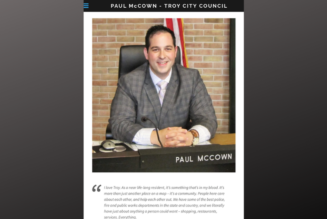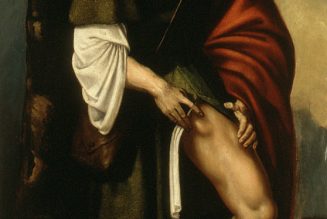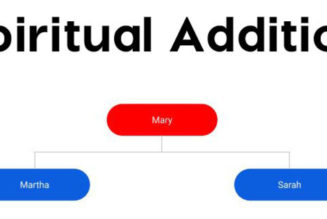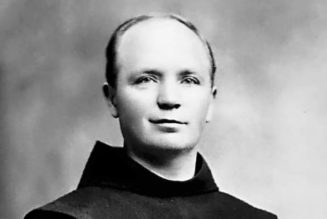
What remains of the actual history of Matthias is faded, but the golden legends of the saints have given his story vibrant colors. Born in Bethlehem of the House of Judah, in perhaps a pious prefigurement of the one he would come to represent, Matthias, meaning “Gift of God,” was well educated in both the law and the prophets. It is said that he lived in dread of the temptations of the flesh and so lived out his youth in meek prudence and manly discipline. The thirteenth-century Golden Legend of Jacobus Voraigne describes Matthias this way: “His courage was inclined to all virtues, for he was humble and debonair, and alway ready to do mercy, and was not proud in prosperity, [not] frail in adversity.”
Matthias was a witness at the baptism of the Lord in the Jordan by John and had followed the Christ in his ministry, embracing at last the good news of his resurrection and ascension. According to traditions supported by the Acts of the Apostles, after Jesus had ascended into heaven and as the day of Pentecost was approaching, Peter assembled the faithful with inspired purpose. He shared his conclusion with his brethren that, since the Lord had chosen twelve men to be his friends, it now behooved them to replace the one who had been lost to evil, so that, as twelve, they may bear witness to the Resurrection unto the ends of the earth.
Among the many assembled there, two were present who had followed the Lord since his baptism, these two being Joseph, called Justus, and Matthias. These two Peter called forth, and, bowing low with the apostles, he prayed that God would make known to them his will in making their fellowship whole again: “Lord, who knowest the hearts of all men, show which one of these two thou hast chosen to take the place in this ministry and apostleship from which Judas turned aside, to go to his own place.”
And so they cast lots for Joseph and Matthias by some lottery that remains unknown. Some believe that it may have been by the Greek custom of marking two stones for each of them and tossing them in an urn until one flew out. When the lot was cast between these two men, they saw Matthias’s token lying before them. Legend has it that at that moment, a ray of light burst from above and bathed Matthias with its radiance, thus bringing heaven’s choice out of human chance, thus bringing good out of evil.
Once enflamed with the Holy Spirit in the upper room, Matthias preached the Resurrection and the life throughout Jerusalem, and from there, his crisscrossing, apocryphal legends begin to branch with an exuberance that may bespeak his fervor even if they say nothing of the facts. Some say Matthias brought the gospel west to Germanic regions. Others say he traveled south to Ethiopia to convert the cannibals. Still others say his evangelical journeys north brought him to Cappadocia. But wherever he went, Matthias is said to have performed many miracles that left people seized with wonder and joy that such a faith was possible. Matthias made the blind see, the sick well, and the dead live, all in the name of Jesus Christ, again bringing good out of evil, even as God himself does in his great and abundant mercy.
There is a tradition that Matthias’s witness was condemned by the high priest of Jerusalem and that he summoned the apostle to make answer for preaching against the Jewish religion. Obeying the order, Matthias humbly appeared, confident in all that he had said and done for the sake of Christ, but the high priest found fault with Matthias and demanded that he repent. Matthias refused, declaring that such an admission would be an apostasy. False witnesses were brought forth to testify against Matthias, and he stood firm, knowing that he had done the work and the will of the Lord.
Matthias was sentenced to death, and the Jews dragged him out to the street to stone him. As the rocks rained down, Matthias prayed that they would be collected and buried so that they might one day rise in witness to the false accusations leveled at him by false men and proclaim his faith. To put an end to his prayers, the executioner’s axe fell upon Matthias, beheading him in the manner of the Romans as he held high his hands and commended his spirit to his God.
Having picked up the scattered fragments from the contested Gospel of Matthias, the ancient theologian Clement of Alexandria cites these words from its alleged author: “we must combat our flesh, set no value upon it, and concede to it nothing that can flatter it, but rather increase the growth of our soul by faith and knowledge.” We may not know much at all about the blessed apostle, St. Matthias, but our faith can still grow by the influence of his legend, as is true for any of the legends of the saints, be they ever so fantastic.
Saintliness is fantastic, and so its pious portrayal in types of fantasy is fitting. The truth of sanctity is, in many ways, more accessible through wild and wonderful tales that surpass the bounds of truth as we know it, for sanctity is of a higher truth. The broken and embellished stories of saints like Matthias can offer a heightened element to the lives of saints, allowing them to appear clearly as citizens of two worlds—two worlds they helped to bring together in Christ. The action of legend renders the invisible aspects of sainthood more visible, tangible, and attractive, giving the heroes of the Church a dimension that goes beyond mere history and mere humanity. By exaggerating the extraordinary features of our holy ancestors, legends enliven the reason why they are saints and, as Matthias did as an instrument of the Lord, bring the good of grace out of the evil of loss.
Join Our Telegram Group : Salvation & Prosperity









